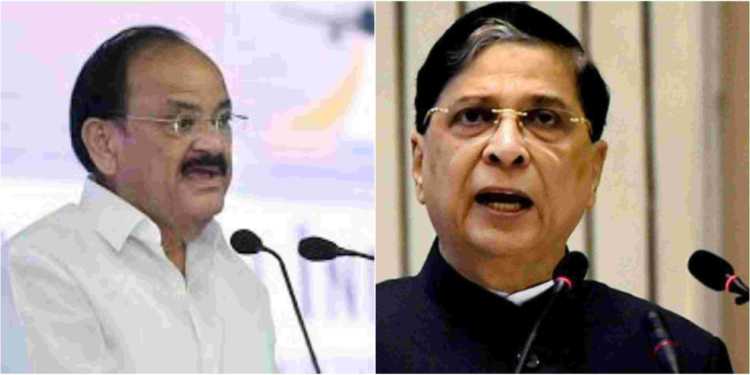The Congress-led opposition has been dealt a severe blow today. The Vice-President of India and Rajya Sabha Chairman Venkaiah Naidu has rejected the Impeachment motion against the Chief Justice of India Dipak Misra. The Impeachment motion was signed by sixty four members of seven political parties and was presented to VP Naidu on the 20th of April. The delegation led by Congress had also hosted a press conference after they presented the motion to Rajya Sabha chairman Naidu. Naidu cut short his visit to Telangana on Sunday and returned to Delhi to consult constitutional and legal experts on the matter at hand. After a hectic Sunday, Naidu revealed his decision today on the Impeachment motion, citing that the motion had “no merit” in the charges leveled against the CJI. Twenty two reasons have been given by Naidu for the rejection of the motion. The ten page order enlisting the grounds for rejection has the signature of Venkaiah Naidu.
The order explores that even if every statement of the Impeachment petition is taken as truth, would it still amount to a case of “proved misbehaviour” within the scope of article 124 (4) of the Constitution of India? The CJI according to the order has not been consulted since the petition involved the CJI directly. The comments made by former Attorney General, constitutional experts and editors of prominent newspapers have been taken into account and also personally consulted before the decision was finally made. These experts have unequivocally and almost unanimously stated that the present notice of Impeachment motion is not fit for the removal of a judge.
Coming to the finer details, the order states that Article 124 (4) uses the expressions ‘proved misbehaviour’ and ‘incapacity’ for the consideration of any such motion, ‘Proved misbehaviour’ is very different from ‘misconduct’ as it is very clear from the language of Article 124 (4) . It is therefore imperative that the allegations be ‘proved’ before the Parliamentary Procedure for removal of a Judge can commence. The first page of the Impeachment motion uses phrases such as “may have been” and “he too was likely”, these words clearly are just assumptions made by the opposition members. The opposition members themselves seem unsure and uncertain of the charges they are putting on the CJI and hence they certainly could not amount to a case of “proved misbehaviour” under Article 124 (4). The conversations between third parties which have dubious credentials cannot be thought of as material evidence against the CJI, the order says.
What #VenkaiahNaidu says about the Impeachment motion
"conversations between third parties with dubious credentials, which have been extensively relied upon, cannot themselves constitute any material evidence against the holder of the office CJI#CJIDipakMisra @VPSecretariat pic.twitter.com/Nghabj7qKA— Bar and Bench (@barandbench) April 23, 2018
The order also states that five honourable Judges have reaffirmed the settled position that the CJI is the ‘Master of the roster’ in the case of Kamini Jaiswal vs Union of India on 14th November, 2017. The order further clarifies that the CJI is ‘first among equals’ and has the right to constitute Benches of the Court and allocate cases to the Benches. No other Bench has the right to direct the CJI on matters of allocation of cases.
The order of rejection issued by Naidu clarifies that this is a matter for the Supreme Court to decide internally. It would be an attack on the ’independence of judiciary’ if the present case of Impeachment is considered on these grounds, which is the basic tenet of the Constitution of India. The independence of the Judiciary had been the prime concern of the founding fathers of the Constitution and it will be under serious threat if the reasons in the motion constitute a worthy Impeachment motion according to the order released by Naidu.
The order also states that it would be ‘inappropriate’ and ‘irresponsible’ to accept statements cited in the Impeachment motion as the statements are not credible and verifiable to say the very least.
There has been a disregard of paragraph 2.2 of the Handbook for members of Rajya Sabha in the way in which the contents of the motions were released to the press and public. Paragraph 2.2 of the Handbook clearly prohibits the publicity of any Notice submitted by a member before it has been admitted by the Chairman and circulated to the members. The press conference held by the Congress led opposition members on April 20th violated this rule, the act of the members discussing the conduct of the CJI in the press is against propriety and parliamentary decorum as it denigrates the institution of the CJI.
This detailed rejection of the points raised in the motion will serve as a reminder to the Congress and other opposition parties in the future. It is a landmark decision made by the Chairman and VP who has disclosed the real reasons for rejection. Today is a historical day as it has dealt a terrible blow to Congress and provided a huge win for the independent Judiciary and for democracy. Reason enough to celebrate.




















